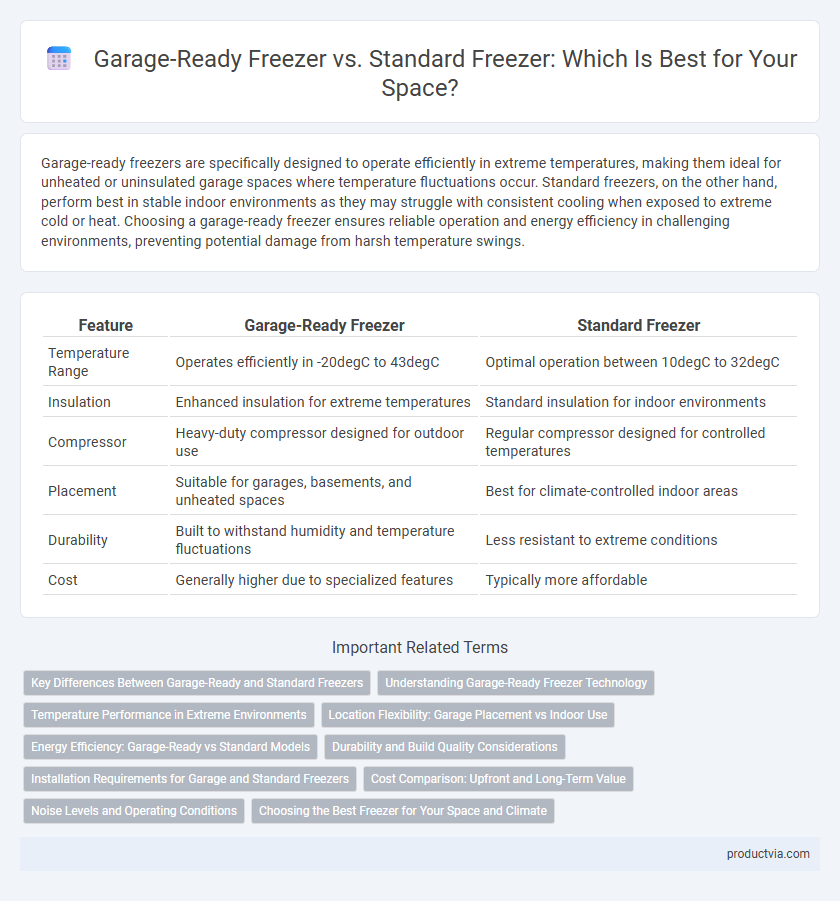Garage-ready freezers are specifically designed to operate efficiently in extreme temperatures, making them ideal for unheated or uninsulated garage spaces where temperature fluctuations occur. Standard freezers, on the other hand, perform best in stable indoor environments as they may struggle with consistent cooling when exposed to extreme cold or heat. Choosing a garage-ready freezer ensures reliable operation and energy efficiency in challenging environments, preventing potential damage from harsh temperature swings.
Table of Comparison
| Feature | Garage-Ready Freezer | Standard Freezer |
|---|---|---|
| Temperature Range | Operates efficiently in -20degC to 43degC | Optimal operation between 10degC to 32degC |
| Insulation | Enhanced insulation for extreme temperatures | Standard insulation for indoor environments |
| Compressor | Heavy-duty compressor designed for outdoor use | Regular compressor designed for controlled temperatures |
| Placement | Suitable for garages, basements, and unheated spaces | Best for climate-controlled indoor areas |
| Durability | Built to withstand humidity and temperature fluctuations | Less resistant to extreme conditions |
| Cost | Generally higher due to specialized features | Typically more affordable |
Key Differences Between Garage-Ready and Standard Freezers
Garage-ready freezers are specifically designed to operate efficiently in extreme temperatures ranging from 0degF to 110degF, making them ideal for unconditioned spaces like garages, whereas standard freezers typically require indoor, climate-controlled environments between 55degF and 110degF. Key features of garage-ready models include enhanced insulation and more powerful compressors to maintain consistent freezing performance regardless of ambient temperature fluctuations. Standard freezers often experience compromised operation and increased energy consumption when placed in environments outside their recommended temperature range.
Understanding Garage-Ready Freezer Technology
Garage-ready freezers feature advanced insulation and enhanced temperature control systems that maintain optimal internal temperatures despite extreme outdoor conditions, unlike standard freezers designed primarily for stable indoor environments. These specialized freezers use reinforced seals and adaptive thermostats to prevent freezing or overheating in garages, where temperatures fluctuate widely. Understanding garage-ready freezer technology is crucial for ensuring food safety and efficient energy use when placing a freezer in unconditioned spaces.
Temperature Performance in Extreme Environments
Garage-ready freezers are engineered with enhanced insulation and adaptive temperature controls, allowing them to maintain optimal internal temperatures even when exposed to extreme cold or heat in unconditioned garage spaces. Standard freezers typically struggle to perform efficiently outside climate-controlled environments, leading to potential temperature fluctuations that can compromise food safety and energy consumption. The superior temperature stability of garage-ready models ensures consistent freezing performance regardless of ambient temperature variations.
Location Flexibility: Garage Placement vs Indoor Use
Garage-ready freezers feature enhanced insulation and temperature-resistant compressors designed to maintain optimal performance in fluctuating garage conditions, unlike standard freezers built primarily for stable indoor environments. These garage-ready models provide greater location flexibility by operating reliably in unheated or unconditioned spaces where temperatures can range from cold winters to hot summers. Standard freezers perform best in controlled indoor settings with consistent ambient temperatures, limiting placement options to kitchens, basements, or laundry rooms.
Energy Efficiency: Garage-Ready vs Standard Models
Garage-ready freezers feature enhanced insulation and sealed compressor components designed to maintain optimal performance and energy efficiency in fluctuating temperatures, unlike standard freezers that may struggle and consume more power in unconditioned spaces. These specialized models prevent excessive energy use by adapting to wider ambient temperature ranges, ensuring consistent freezing without overworking the compressor. Consequently, garage-ready freezers offer significant energy savings and durability when placed in garages or other unheated environments compared to standard freezer units.
Durability and Build Quality Considerations
Garage-ready freezers feature enhanced insulation, heavy-duty compressors, and weather-resistant exteriors designed to withstand extreme temperatures and humidity fluctuations common in garage environments. Standard freezers typically lack these robust build qualities, making them prone to performance issues or damage when placed in non-climate-controlled areas. Investing in a garage-ready freezer ensures consistent temperature maintenance, durability against environmental stressors, and prolonged appliance lifespan in challenging settings.
Installation Requirements for Garage and Standard Freezers
Garage-ready freezers feature enhanced insulation and temperature control systems allowing reliable operation in unheated environments ranging from -10degF to 110degF, unlike standard freezers which require indoor, temperature-stable conditions typically between 55degF and 110degF. Installation requirements for garage-ready freezers include minimal ventilation and straightforward electrical hookups suited for unconditioned spaces, whereas standard freezers must be installed in climate-controlled areas to prevent compressor strain and ensure optimal performance. Proper placement of garage-ready freezers avoids issues like freezing thermostat controls or overheating compressors common with standard freezers in garages.
Cost Comparison: Upfront and Long-Term Value
Garage-ready freezers typically cost 10-20% more upfront than standard freezers due to reinforced insulation and temperature-resistant components designed for fluctuating garage climates. Over time, garage-ready freezers offer better energy efficiency in extreme temperatures, potentially lowering electricity bills by 15-25% compared to standard models that may struggle or need replacement. Standard freezers have a lower initial price but can incur higher long-term costs from increased energy use and earlier breakdowns when placed in unconditioned spaces like garages.
Noise Levels and Operating Conditions
Garage-ready freezers are specifically designed to operate efficiently in extreme temperatures ranging from 0degF to 110degF, making them ideal for unconditioned spaces like garages, whereas standard freezers typically require indoor environments with stable temperatures between 55degF and 110degF. Noise levels in garage-ready freezers are often optimized to minimize disruption in semi-outdoor areas, while standard freezers can produce louder operational sounds that might be more noticeable in quieter indoor settings. Choosing a garage-ready freezer ensures reliable performance and quieter operation under variable temperature conditions compared to standard freezers.
Choosing the Best Freezer for Your Space and Climate
Garage-ready freezers are specifically designed to operate efficiently in extreme temperatures, ranging from -10degF to 110degF, making them ideal for unheated or variable climates. Standard freezers typically function best within a controlled indoor temperature between 55degF and 85degF, limiting their placement options to more stable environments. Selecting garage-ready models ensures reliable performance and energy efficiency in harsh conditions, while standard freezers suit consistent indoor settings.
Garage-ready freezer vs Standard freezer for placement Infographic

 productvia.com
productvia.com